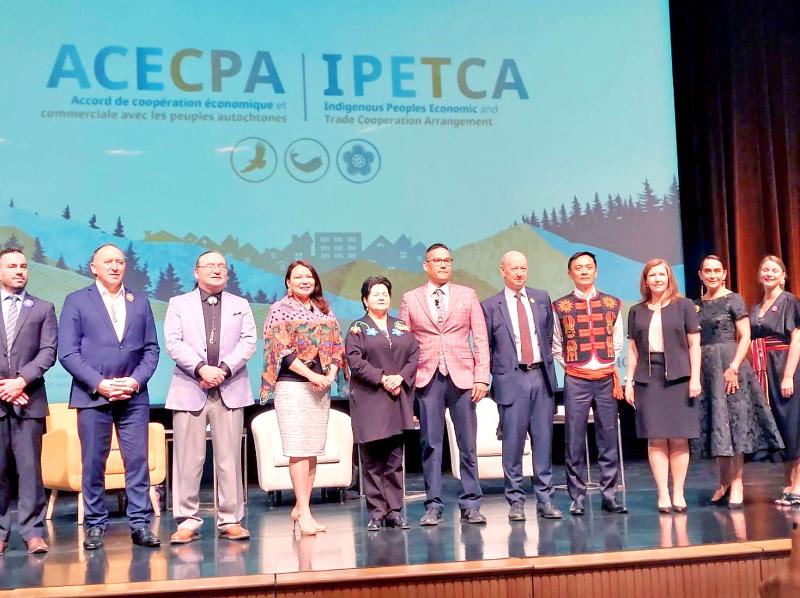Taiwan shared the stage with Canada, New Zealand and Australia to inaugurate a new multilateral pact to help indigenous people establish international businesses, the Council of Indigenous Peoples (CIP) said yesterday.
Taiwan on Wednesday last week helped launch the Indigenous Peoples Economic and Trade Cooperation Arrangement (IPETCA), an international trade framework for indigenous entrepreneurs, hosted by Global Affairs Canada, which overseas Canada’s international engagement, the CIP said.
At the two-day event in Ottawa, Taiwan was represented by Pingtung-based company executive Yeh Chih-ping (葉治平) in his capacity as a business consultant to Taiwan’s indigenous people, the CIP said in a statement.

Photo courtesy of the Council of Indigenous Peoples
Yeh also joined Canadian Chief Trade Commissioner Sara Wilshaw and New Zealander Traci Houpapa, a Maori company director, in a discussion about strengthening partnerships under the trade pact, which was initiated by New Zealand during the APEC forum last year.
IPETCA is comprised of founding members Canada, Australia, New Zealand and Taiwan, and is open to all APEC economies to join, the New Zealand Ministry of Maori Development said.
The focus of the IPETCA is to strengthen the economic empowerment of indigenous people throughout the Asia-Pacific region by promoting greater indigenous trade and economic links, and ensuring international focus on indigenous concerns, the New Zealand government said.

SEEKING CLARITY: Washington should not adopt measures that create uncertainties for ‘existing semiconductor investments,’ TSMC said referring to its US$165 billion in the US Taiwan Semiconductor Manufacturing Co (TSMC, 台積電) told the US that any future tariffs on Taiwanese semiconductors could reduce demand for chips and derail its pledge to increase its investment in Arizona. “New import restrictions could jeopardize current US leadership in the competitive technology industry and create uncertainties for many committed semiconductor capital projects in the US, including TSMC Arizona’s significant investment plan in Phoenix,” the chipmaker wrote in a letter to the US Department of Commerce. TSMC issued the warning in response to a solicitation for comments by the department on a possible tariff on semiconductor imports by US President Donald Trump’s

The government has launched a three-pronged strategy to attract local and international talent, aiming to position Taiwan as a new global hub following Nvidia Corp’s announcement that it has chosen Taipei as the site of its Taiwan headquarters. Nvidia cofounder and CEO Jensen Huang (黃仁勳) on Monday last week announced during his keynote speech at the Computex trade show in Taipei that the Nvidia Constellation, the company’s planned Taiwan headquarters, would be located in the Beitou-Shilin Technology Park (北投士林科技園區) in Taipei. Huang’s decision to establish a base in Taiwan is “primarily due to Taiwan’s talent pool and its strength in the semiconductor

An earnings report from semiconductor giant and artificial intelligence (AI) bellwether Nvidia Corp takes center stage for Wall Street this week, as stocks hit a speed bump of worries over US federal deficits driving up Treasury yields. US equities pulled back last week after a torrid rally, as investors turned their attention to tax and spending legislation poised to swell the US government’s US$36 trillion in debt. Long-dated US Treasury yields rose amid the fiscal worries, with the 30-year yield topping 5 percent and hitting its highest level since late 2023. Stocks were dealt another blow on Friday when US President Donald

UNCERTAINTY: Investors remain worried that trade negotiations with Washington could go poorly, given Trump’s inconsistency on tariffs in his second term, experts said The consumer confidence index this month fell for a ninth consecutive month to its lowest level in 13 months, as global trade uncertainties and tariff risks cloud Taiwan’s economic outlook, a survey released yesterday by National Central University found. The biggest decline came from the timing for stock investments, which plunged 11.82 points to 26.82, underscoring bleak investor confidence, it said. “Although the TAIEX reclaimed the 21,000-point mark after the US and China agreed to bury the hatchet for 90 days, investors remain worried that the situation would turn sour later,” said Dachrahn Wu (吳大任), director of the university’s Research Center for